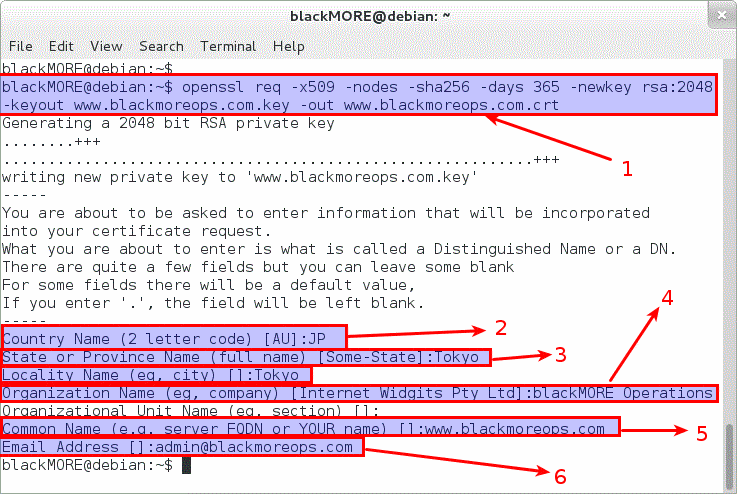Openssl Generate 2048 Rsa Key
How to generate keys in PEM formatusing the OpenSSL command line tools?
RSA keys
The JOSE standard recommends a minimum RSA key size of 2048 bits.
Openssl genrsa -des3 -out private.pem 2048. That generates a 2048-bit RSA key pair, encrypts them with a password you provide and writes them to a file. You need to next extract the public key file. You will use this, for instance, on your web server to encrypt content so that it can only be read with the private key. Export the RSA Public Key. RSA Key Generator. Format Scheme. Warning: Keys larger than 512 bits may take longer than a second to create. Public Key: Copy Public Key Private Key: Copy Private Key × This definition is not available in English, sorry! Copy Private Key ×. Openssl genrsa -des3 -out private.pem 2048. That generates a 2048-bit RSA key pair, encrypts them with a password you provide and writes them to a file. You need to next extract the public key file. You will use this, for instance, on your web server to encrypt content so that it can only be read with the private key. Export the RSA Public Key.
Watch dogs cd key generator free download. To generate a 2048-bit RSA private + public key pair for use in RSxxx and PSxxxsignatures:
Elliptic Curve keys
To generate an EC key pair the curve designation must be specified. Note thatJOSE ESxxx signatures require P-256, P-384 and P-521 curves (see theircorresponding OpenSSL identifiers below).
Elliptic Curve private + public key pair for use with ES256 signatures:
Elliptic Curve private + public key pair for use with ES384 signatures:
Elliptic Curve private + public key pair for use with ES512 signatures:
PEM key parsing in Java
The BouncyCastle library provides a simpleutility to parse PEM-encoded keys in Java, to use them for JWS or JWE later.
For Maven you should include the following BouncyCastle dependencies (where1.52 is the latest stable version as of May 2015):
Example parsing of an PEM-encoded EC key in Java:
| # Generate Private Key and Certificate using RSA 256 encryption (4096-bit key) |
| openssl req -x509 -newkey rsa:4096 -keyout privatekey.pem -out certificate.pem -days 365 |
| # Alternatively, setting the '-newkey' parameter to 'rsa:2048' will generate a 2048-bit key. |
| # Generate PKCS#12 (P12) file for cert; combines both key and certificate together |
| openssl pkcs12 -export -inkey privatekey.pem -in certificate.pem -out cert.pfx |
| # Generate SHA256 Fingerprint for Certificate and export to a file |
| openssl x509 -noout -fingerprint -sha256 -inform pem -in certificate.pem >> fingerprint.txt |
| # Generate SHA1 Fingerprint for Certificate and export to a file |
| #openssl x509 -noout -fingerprint -sha1 -inform pem -in certificate.pem >> fingerprint.txt |
| # FYI, it's best practice to use SHA256 instead of SHA1 for better security, but this shows how to do it if you REALLY need to. |

commented Nov 7, 2019
Here's a couple useful links related to this: |